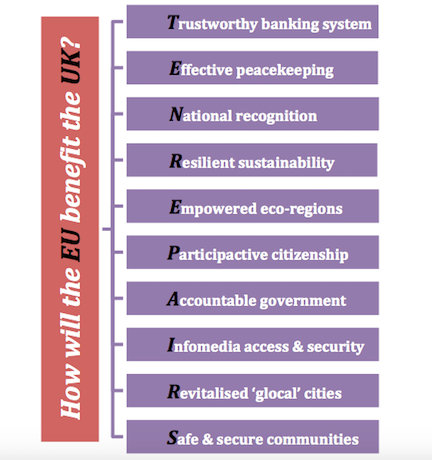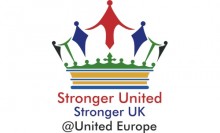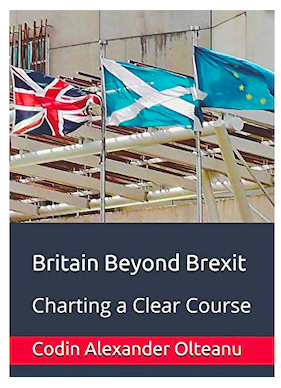
The BREXIT Referendum is not simply about whether the UK should stay within the EU or leave. It is about how we see ourselves and our role in the world, as citizens of the first union of four free nations into a United Kingdom of equal freedoms, opportunities, and dignity for us all, where he have a real voice and a meaningful vote in shaping our futures. To achieve this vision of equal dignity, respect, and opportunity for all we must address ten key challenges - the TEN REPAIRS - that can be successfully mastered only if a strong United Kingdom remains at the heart of a reformed European Union:
1. Trustworthy banking system: A wide-ranging consensus has emerged among academics, professionals, and serious politicians that a safe, stable, secure and trustworthy financial system requires to be regulated and monitored by a supranational organisation, at the very least at the European level, if not at the Euro-Atlantic one, and that the UK's exit from the EU would lead to devastating consequences for both the British financial sector and its long-term economic prosperity. As former UK Prime Minister Gordon Brown and current Governor of the Bank of England David Carney both agree, twenty-first century financial problems can only be tackled in a sustainable and long-term manner by effective, accountable, and legitimate supranational institutions, at European and even Euro-Atlantic levels.
2. Effective peacekeeping: The horrific events in Paris on November 14, 2015 revealed to those who still harboured any doubts about it how well our enemies have understood and are capable of exploiting the concept of full spectrum environment in the information age - in a manner our current crop of politicians has not only not yet mastered, but is actively blocking from emerging due to its members’ utter incapacity to think outside the national silos our Armed Forces chiefs were referring to with such sense of urgency and foreboding at thee London DSEI 2015 Exhibition only a few weeks before these criminal acts took place so close to our borders. The seamless integration by terrorist networks of the national and international, domestic and foreign, real and virtual, European and Middle Eastern factors in achieving dramatic results with vastly asymmetrical resources represent a dire indictment of our political elites and the exposure of their glaring refusal to acknowledge and act upon that very “paradigm shift” explained in detail by Chief Air Marshal Gen. Pulford. Prime Minister Cameron’s make-shift and ineffective solutions combined with his utter refusal to cooperate in a meaningful manner with our European partners in addressing in a humanitarian and secure manner the vast flows of refugees unleashed by the ongoing conflicts in the Middle East whilst at the same time calling for integrated EU border security forces to be deployed at the national leaders’ whim, without any trace of legitimacy, accountability and democratic control – paint us in a corner without issue and discredit us entirely in the eyes of our European colleagues, our NATO allies, of global civil society and not least, in the eyes of most Britons themselves.
3. National recognition: Only within the EU can all British nations be truly unshackled and acquire the knowledge, presence, and access to become influential players within the UK, the EU, and even globally. Leaving the EU would inevitably result in the continuing dominance of England in general and the London/South east region in particular over all other regional and national communities of the UK. It could even result in the actual break-up of the United Kingdom, as Scotland - and potentially Northern Ireland would refuse to be dragged out of the EU by English votes and decide to hold their own independence referendums, that would then allow them to re-join the EU as full members endowed with all the rights of full Member States.
4. Resilient sustainability: The four pillars of sustainability are: Cultural vitality; Social equity; Environmental responsibility; Economic viability. We also need to develop the resilience that will enable us to survive the unexpected future shocks that by definition we cannot account and plan for today. The claim according to which each sovereign nation-state can protect what individual national élites perceive to be their country's "national interest" and at the same time achieve comprehensive agreements on climate change, fair trade, humanitarian intervention, refugee relief, financial regulation, or any other of the critical challenges we face today in Britain, Europe, and across the world is utterly unrealistic. We will achieve resilient sustainability as a united European continent working in close cooperation with our global partners, or not at all. To do so, we need to re-form, democratise, render more efficient, effective, and responsive to our needs both our European and national levels of government and ensure they work together in a coordinated, cooperative manner, aiming to achieve the same objective: resilient sustainability.
5. Empowered eco-regions: Our cities serve as anchors to, and are embedded in, emerging eco-regions being now created by communication, technological, knowledge and production networks that did not exist 50, let alone 100 or 200 years ago, when our political boundaries within the UK were drawn. Yet we lack any rational, systematic, organic ways to govern them by shepherding their common resources and establishing strategic development plans that would benefit their people, their industries, their knowledge and learning networks, their natural environments, and connect them to similar eco-regions across Europe and North America. Our European partners have a great deal more experience than us with such eco-regions, both trans-border and within single countries. The EU provides knowledge, technical support, and funds for their development and growth, as well as their integration within a wider and deeper European space that would allow them to reach their full potential and to benchmark their activities and progress against the best practices of other, similar eco-regions.
6. Participactive citizenship: Stronger United takes the notion of active citizen participation and deliberative democracy seriously. We put the individual citizen - each and every one of us – at the heart of our system of governance, on a daily basis, and not at its fringes, once every five years. This is the fundamental divide between Stronger United on the one hand, and both current “Stay” and “Leave” camps on the other. We see the BREXIT Referendum as the starting point for resolving the crisis of governance Britain faces today – and in doing so, we aim to step in the tracks of many illustrious British reformers who have accomplished such arduous tasks each time they were required, over the past three centuries. Both the “Leave” and Team Cameron-led “Stay” camps see the BREXIT vote as an end-point – the end of reform, the death of change, the continuation of a system that has become outdated, unaccountable, undemocratic the 21st Century, where all power that matters remains concentrated in their hands and those of the London élites who aid and abet them, and profit mightily from their support. By aiming to break this monopoly of power hugely concentrated in the hands of Team Cameron and his acolytes, Stronger United aims to empower us all to create a new structure of governance for the UK and for Europe that breaks the monopoly of power of the London élites, now incapable of resolving the challenges we face in an effective, accountable, and legitimate manner. Its ultimate goal is to allow actual citizens to fully exercise their abilities to actively discuss, debate, decide and implement real solutions to urgent problems at the level of governance where this can be best achieved – be it community, city, national, UK, European or Euro-Atlantic levels of decision-making, and based on fundamental principles of absolute inclusion, deep diversity, and the power of the best argument: in short to fully engage in ParticipActive Citizenship as a daily way of life, rather than just in voting as a periodic event “granted” to most of us by our governing élites just twice a decade.
7. Accountable government today must do away with the false dichotomy between governing élites and governed masses, between all-powerful rulers and compliant subjects, between voting citizens and non-voting denizens. Accountable government today must be re-focused from a sporadic notion of “spasmodic supervision” of our “elected Representatives” by means of an up or down vote every few years to the continuous actions of citizens defined by the idea of “accountable autonomy”. Achieving this ideal of “accountable autonomy” of a system of governance defined by constant interactions between fully empowered citizens – a government for the people, by the people, and of the people – is the ultimate goal of the process of reform we must engage now in if we are to successfully master the many daunting challenges we face at present. We can only truly accomplish this daunting yet exhilarating task in full concert with our fellow European citizens, living from one end to the other of the continent we all call “home”. A Stronger United Kingdom can only be a european United Kingdom – just as A United Europe can only be a European Union that includes the UK – all of it, and not just one or another of its constituent nations. Truly accountable government for, by, and of empowered citizens who participate actively in creating and steering their own destinies at local, municipal, national, and European levels of governance, can only be achieved if we remain an integral, dynamic part of the European Union and take the lead in bringing about these vital and much-needed changes, first in the UK and then across the continent.
8. Infomedia access and security: After the shocks of Wikileaks disclosures and Snowdon revelations, after innumerable occurrences of commercial loss and theft of consumer data, after the increasing use of criminal and terrorist networks of social media for indoctrination, recruitment, and operational purposes most recently illustrated by the San Bernardino massacre in California, governments world-wide are clamping down more and more on the free access and use of private citizens and organisations of the Information Highway. The Chinese, Russian, and Iranian governments may lead these trends asserting that “cyber sovereignty” trumps free expression for individuals and increasingly demand a direct say in the manner the internet is governed at the global level, but they are certainly not alone in trying doing so. Governments of democratic countries, including Britain, the USA, and Eu member states have embarked on similar paths, even if somewhat less intrusively and aggressively than the autocratic states named above. In the UK, the recent controversy regarding the adoption of the UK Communications Data Bill is proof of the intensely political nature of national legislations on this issue. Clearly, this is not an issue or a debate that the UK can settle on its own. The only way to address these urgent and complex issues in an effective, efficient and legitimate manner is to establish common rules and principles at the European and Euro-Atlantic levels, in such a way as to achieve with full citizen participation and support the optimum balance between individual privacy and common security, commercial freedom and public information, governmental control and government accountability.
9. Revitalised 'glocal' cities: Critical urban challenges that affect almost every single one of us cannot be fixed by a Westminster government that refuses to devolve the necessary power and resources where they are needed most. Nor can they be met without the support and assistance of European funds and networks of development and cooperation. Breaking these emerging ties between British and European cities - their ability to benchmark their activities, to learn from each other, to help each other as they face similar challenges, will only reinforce the central powers of our London élites and deepen the level of inequality between and within cities that has become the hallmark of Britain's modern urban life.
10. Safe and secure communities: We live in a multi-faceted, hybrid environment whose safety and security can only be guaranteed by cross-border cooperation between all threat-preventing networks, from national police organisations, to international security groups, to actual armed forces and NATO itself. They all constitute a continuum that must be capable of deploying, in an effective and legitimate manner, the full spectrum effects of increasingly sophisticated tools aiming to both prevent and deal with the consequences of break-downs in human security. These can happen at any level - locally in our communities, nationally in our cities, regionally and globally in countries such as the Ukraine, Syria and Iraq, but also virtually throughout of increasingly sophisticated and accessible computer networks that act as both enablers and gate-keepers of our daily lives, both private and public.

